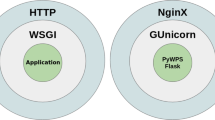
Overview
- Learn the ‘fastest’ Python web framework
- Study API and microservices development
- Employs modern Python features
Access this book
Tax calculation will be finalised at checkout
Other ways to access
About this book
Build APIs and web apps based on Asynchronous Server Gateway Interface (ASGI). This book provides a comprehensive explanation of using Pydantic models to construct the request/response objects in a FASTAPI path operation.
You’ll start by reviewing type hints in Python and the asynchronous processing concepts. One of the highlights of FastAPI is its auto generation of API docs. Pydantic library is the main pillar on top of which FastAPI is built. You’ll see that ASGI has a far better performance compared to most of the other popular Python frameworks as they implement Web server Gateway Interface (WSGI), which is synchronous in nature and hence having slower response time.
This book thoroughly explains how FastAPI interacts asynchronously with relational as well as NOSQL databases. Modern web apps use template engines to interact with the front-end. In this book, you will learn to use jinja2 templates and static assets. Swagger UI and OpenAPI standards are also covered in detail. Finally, different options of deployment of FastAPI app have been explored in this book.
This book uses practical examples to empower you to build high performance APIs
What You'll Learn
- Develop robust and high-performance web apps
- Deploy the FastAPI app for public availability using cloud services such as Deta and Docker container
- Understand the important building blocks of a web app such as form handling, templating and database interaction
Who This Book Is For
Aspiring and the experienced Python developers looking to leverage the flexibility of Python and the powerful features introduced in Modern Python. Computer science Engineering students at graduate and postgraduate level will also benefit immensely from the practical approach adapted in the book.
Similar content being viewed by others
Keywords
Table of contents (10 chapters)
Authors and Affiliations
About the author
Bibliographic Information
Book Title: High-Performance Web Apps with FastAPI
Book Subtitle: The Asynchronous Web Framework Based on Modern Python
Authors: Malhar Lathkar
DOI: https://doi.org/10.1007/978-1-4842-9178-8
Publisher: Apress Berkeley, CA
eBook Packages: Professional and Applied Computing, Apress Access Books, Professional and Applied Computing (R0)
Copyright Information: Malhar Lathkar 2023
Softcover ISBN: 978-1-4842-9177-1Published: 28 March 2023
eBook ISBN: 978-1-4842-9178-8Published: 27 March 2023
Edition Number: 1
Number of Pages: XX, 309
Number of Illustrations: 103 b/w illustrations
Topics: Web Development, Python



